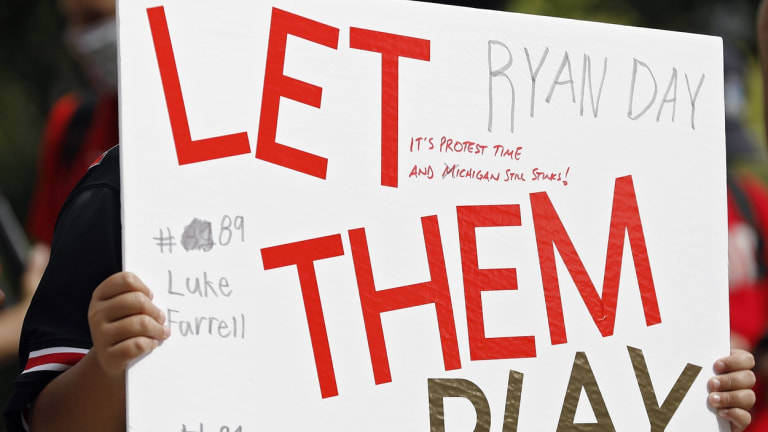
Still in Crisis Mode, Reeling Big Ten Looking at Fall Football. Again.

Big Ten officials will vote as early as Sunday on a proposal to start playing football this fall, Yahoo’s Pete Thamel, ESPN.com and other outlets are reporting. A mid-October date is possible, but the date also could be later.
A medical subcommittee led by Penn State athletic director Sandy Barbour and Ohio State lead team physician Dr. Jim Borchers presented new information to a group of eight presidents and chancellors on Saturday.
Key points discussed were updated information about the myocarditis threat, plus at least four rapid response tests that could allow Big Ten teams to do daily virus tests.
The vote could be pushed back to Monday or Tuesday as conference officials weigh the information and their options.
A return date of Oct. 17 is one possibility, but any number of hurdles remain. Among them: Maryland and Wisconsin football activities are currently on pause due to positive testing.
So what’s going on? Why is the Big Ten, after canceling its football season on Aug. 11, still revisiting that decision now?
For starters, the outrage over that decision has not gone away. Prominent coaches such as Ohio State’s Ryan Day and Michigan’s Jim Harbaugh have attacked the decision and called for it to be reversed. Penn State’s James Franklin has expressed frustration at poor communications surrounding the decision.
Nebraska players have filed suit. Ohio’s state attorney general said he is considering a legal challenge. Republican lawmakers from six states joined together to urge the Big Ten to play football this fall. President Donald Trump, looking for votes in key battleground states in Big Ten territory, put in a call to commissioner Kevin Warren.
And fans, parents and players also have been expressing their outrage that other schools can play football while the Big Ten is shut down.
In short, the decision to cancel Big Ten football this fall won’t go away.
What’s fanning the flames now is seeing other college leagues play football. While the Pac-12 and Big Ten decided pandemic football was not safe, the ACC, Big 12 and SEC have soldiered on.
Warren has taken the brunt of the heat. But the presidents and chancellors, who voted 11-3 to cancel football, made the official call. They may have genuinely believed it was not safe to play football. But they miscalculated how much the game meant to so many people.
And Warren, in his first year on the job, was not up to the job of either providing a plan that convinced school leaders to proceed with caution—or to explain to the world why the plug was being pulled on Big Ten football.
What the Big Ten has now is a mess that already is having lingering effects: This is a public-relations disaster of epic proportions. And the budget shortfalls will have major impacts at Big Ten athletic departments for a long time.
On top of this, the people who made the decision to cancel football when other conferences were marching on have called their own leadership into question. How that plays out remains to be seen.
Whether the conferences that are playing football will be able to complete a season remains an open question. But they are trying.
The Big Ten, meanwhile, is trying to do damage control. And not doing that very well, either.
Who knew that putting safety ahead of football would prove to be so hazardous?
Not Kevin Warren and the Big Ten’s 14 chancellors and presidents.